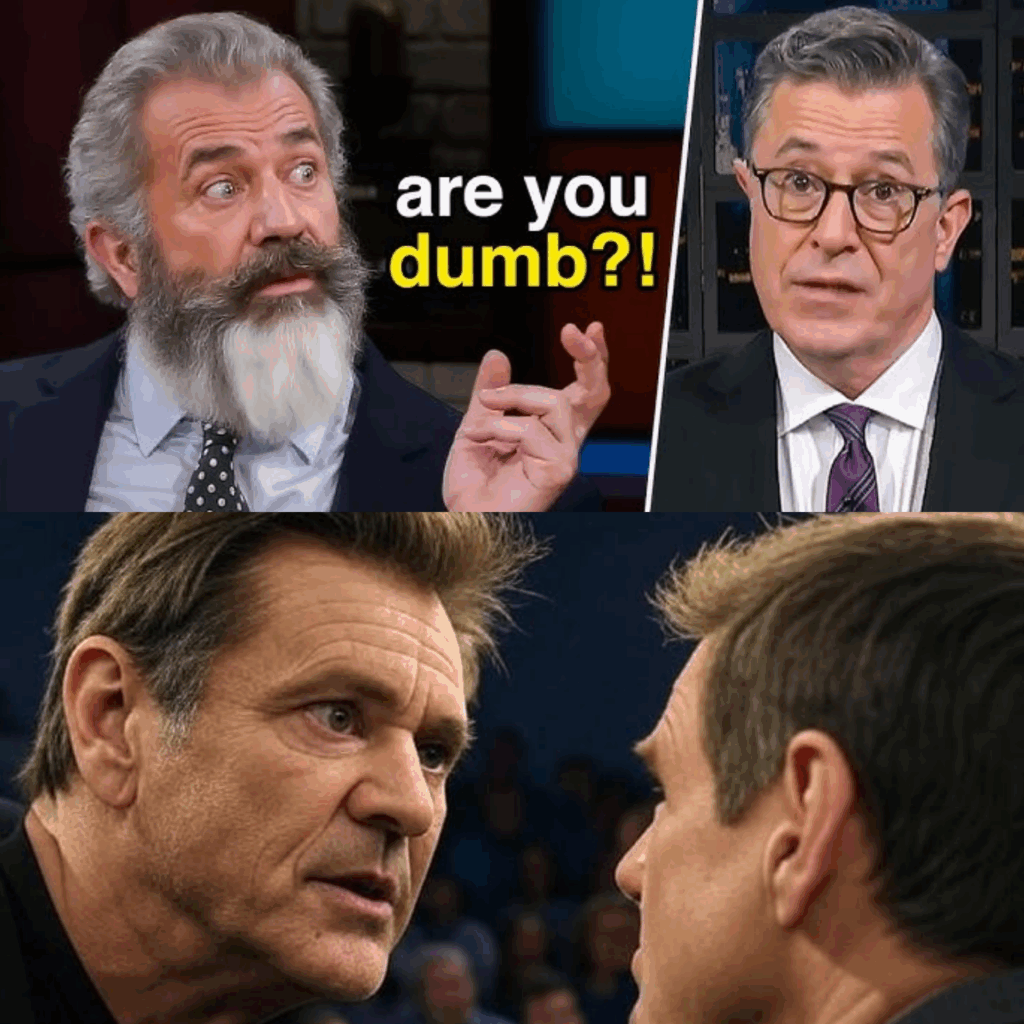Mel Gibson’s Epic Clapbacks: How Hollywood’s Most Controversial Star Outsmarted Every Rude Interviewer
When it comes to Hollywood comebacks, no one rewrites the rules—or the script—quite like Mel Gibson. The mainstream media loves to control the narrative, painting their heroes and villains with broad strokes. But whenever Gibson’s in the hot seat, he doesn’t just dodge loaded questions; he flips the entire interview into something raw, unpredictable, and often hilarious. No matter how determined a reporter is to corner him with controversy, Gibson is always ready with a comeback that leaves interviewers scrambling—and viewers stunned.
From his earliest days on the international stage, Mel Gibson demonstrated a knack for turning awkward or even condescending questions inside out. Decades before “cancel culture” became a buzzword, a 1983 reporter in Cannes tried to get philosophical about an actor’s responsibility to “the image of humanity.” The question was clumsy and dripping with pretension, but Gibson shut it down with a dry, “I think it’s a silly question, I’m sorry.” In a single sentence, he reminded everyone that not only does he refuse to take Hollywood too seriously, but he’s got no patience for fake-deep interrogations wrapped in poetic nonsense.
.
.
.
Fast forward to the Colbert show, where Stephen Colbert tried teeing up a “theological roast” about Gibson’s sequel to “The Passion of the Christ.” Colbert joked he’d read “the book” and already knew how the story was going to end. Gibson didn’t bite—instead, he turned Colbert’s setup into a measured, almost sermon-like reflection on the depth and wonder of the resurrection story. “It’s more than a single event. It’s an amazing event. And to underpin that with the things around it is really the story—to sort of enlighten what that means,” Gibson replied, leaving Colbert with nothing to mock and the audience with something to chew on.

But Gibson’s sharpest moments come whenever the media tries to drag up his most difficult years. In the midst of the devastating LA wildfires—which destroyed his home—the press was hungry for soundbites on loss and redemption. Instead, Gibson used the moment to torch the political powers behind the disaster, blaming “monumental mismanagement by our elected officials.” When asked about “building back better,” he scoffed: “Have you ever seen government build back better? … The last thing any of us who have been burned out need are a bunch of bureaucrats telling us how to rebuild our communities.”
Time and again, he turns interviews into indictments—whether it’s shaming political failures or dismissing Hollywood’s self-importance. Even when confronted directly with his past controversies, as in one interview where an anchor tried a psychological takedown disguised as “deep concern,” Gibson remained unphased: “That’s almost four years ago, dude. I mean, I’ve moved on. I guess you haven’t.” It’s the kind of response that leaves nothing but uncomfortable silence on the other end.
But Gibson isn’t simply combative; he’s always in control of his tone and narrative. When he was supposed to bask in the glow of a “comeback” with “Hacksaw Ridge,” the press kept calling it his “return to Hollywood.” Gibson gleefully turned the narrative around: “Well, you know, I haven’t directed in 10 years so I guess in a sense it is a comeback—but it’s nice because it meant I had somewhere to come back from.” He even poked fun at “Hollywood” as just a sign on a hill, reminding everyone that his blockbuster was an independent film shot in Australia.
His ability to derail attempts at typecasting is legendary. When pressured about being remembered only for “Lethal Weapon,” Gibson smirked and admitted no one likes to be pigeonholed, before pointing out that his choices are guided by instinct, not public expectation. “You’ve done pretty good. Your instincts must be pretty hot on that,” a host admitted. Gibson grinned, “I just follow my nose. You got to do what you enjoy and where you feel you should.”
And when an interviewer tried to draw a parallel between Gibson’s own struggles and younger actors like Shia LaBeouf—a classic Hollywood “gotcha”—Gibson skewered the whole premise with empathy and honesty: “My heart goes out to the poor guy. … He’s suffering in some way, or why would he do that? People are inclined to judge, but I’m sure he’s going through some kind of painful, cathartic thing. He’ll probably come back. I like the kid. I think he’s a good actor.” Rather than trivializing mental health or biting at the bait, Gibson turned it into a real conversation about the pressure-cooker life in the spotlight.
Even questions about his artistic decisions—why “The Passion of the Christ” wasn’t made in English, for instance—are flipped on their head. “I just followed the book, basically,” he answered, reducing controversy to common sense and shutting down overanalysis with a shrug.
And in one of Colbert’s most probing segments, Colbert tried to corner Gibson using their shared Catholic faith: did Gibson’s “suffering” after a decade as a Hollywood pariah teach him any value? Gibson’s answer was classic: “Gravel rash suffering. Well, less time on the meat rack after it’s all done, right?” Silence. Laughter. Interview over.
Time and again, Mel Gibson proves that no matter how intent the media is on controlling the narrative, he won’t play along. Armed with humor, brutal honesty, and zero tolerance for media gamesmanship, Gibson isn’t just a survivor of controversy—he owns it. And as long as interviewers keep coming for him, he’ll keep delivering exactly the story he wants to tell.
News
Heartbreaking: Hulk Hogan’s Last Wish Revealed—You Won’t Believe His Ultimate Regret!
Hulk Hogan’s Final Tragedy: Wrestling Icon Dies Estranged from Family, Never Meeting His Grandchildren July 2025 – The world of…
Astronomer Hires Gwyneth Paltrow—Her EPIC Response to Chris Martin’s Controversy!
Gwyneth Paltrow’s Ultimate Power Move: How She Turned Her Ex-Husband’s Joke Into Tech’s Most Brilliant PR Stunt Boston, 2025 In…
Leaked Footage SHOCKS Fans: Kristin Cabot & Billionaire Andy Byron in Hot Water After Coldplay Kiss Cam!
The $38 Million Kiss: How a Viral Coldplay Concert Clip Sparked the Most Expensive Scandal in Tech History Boston, July…
Melania BETRAYS Trump: Epstein Bombshell DROPS at the WORST Possible Moment!
Melania’s Revenge: Will Trump’s Wife Be the Ultimate Betrayer in the Epstein Scandal? She Was Never Loyal—And Now the Truth…
Elon Musk EXPOSES Trump’s Criminal Secrets—Ghislaine Coverup UNRAVELS LIVE!
When Justice Is for Sale: The Maxwell Gambit, Trump’s Power Play, and America’s Crisis of Truth Washington, August 2025 —…
King Charles SHOCKS Trump & Melania With LIVE TV Bombshell—Watch Trump Explode!
The Final Unraveling: Trump’s Epstein Inferno Reaches the Palace Gates August 2025, London/Washington — The wildfire of the Epstein scandal…
End of content
No more pages to load












